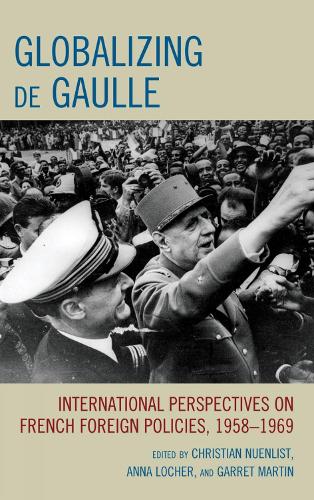
Globalizing de Gaulle: International Perspectives on French Foreign Policies, 19581969
(Paperback)
Publishing Details
Globalizing de Gaulle: International Perspectives on French Foreign Policies, 19581969
By (Author) Christian Nuenlist
Edited by Anna Locher
Edited by Garret Martin
Contributions by Jeffrey James Byrne
Contributions by Carolyn Davidson
Contributions by James Ellison
Contributions by Joaqun Fermandois
Contributions by Carine Germond
Contributions by Gadi Heimann
Contributions by Mark Kramer
Bloomsbury Publishing PLC
Lexington Books
25th August 2011
United States
Classifications
Tertiary Education
Non Fiction
International relations
944.0836
Physical Properties
Paperback
326
Width 160mm, Height 230mm, Spine 19mm
494g
Description
French President Charles de Gaulle (1958-1969) has consistently fascinated contemporaries and historians. His visionconceived out of national interestof uniting Europe under French leadership and overcoming the Cold War still remains relevant and appealing. De Gaulle's towering personality and his challenge to US hegemony in the Cold War have inspired a vast number of political biographies and analyses of the foreign policies of the Fifth Republic mostly from French or US angle. In contrast, this book serves to rediscover de Gaulle's global policies how they changed the Cold War.
Offering truly global perspectives on France's approach to the world during de Gaulle's presidency, the 13 well-matched essays by leading experts in the field tap into newly available sources drawn from US, European, Asian, African and Latin American archives. Together, the contributions integrate previously neglected regions, actors and topics with more familiar and newly approached phenomena into a global picture of the General's international policy-making. The volume at hand is an example of how cutting-edge research benefits from multipolar and multi-archival approaches and from attention to big, middle and smaller powers as well as institutions.
Reviews
This is a superb volume on postwar France, well written, thoroughly researched, and based in part on new archival material. It is centered on the person of Charles de Gaulle, whose aims and moves, though sometimes based on an effect of surprise, seem less mysterious in retrospective than they appeared to be at the time to Anglo-American leaders largely unable to comprehend, or accept,a resurrection of France that bore the ineluctable stamp of the General. -- Charles G. Cogan, Harvard University
This volume is a welcome addition to the literature on the diplomacy of President Charles de Gaulle. Its contributors explore de Gaulles foreign policies throughout the 1960s in their various international ramifications. Based on recent historiography, the book appropriately seeks to move beyond the 'Gaullist' orthodoxy (or mythology) as well as the systematic rejection (or denunciation) that has long characterized 'Anglo-Saxon' appraisals. -- Frdric Bozo, Sorbonne (University of Paris III)
This book presents some of the best work from a new generation of historians seeking to understand the tensions between rhetoric and reality in this enigmatic statesman. * Foreign Affairs *
Fourteen essays by scholars from four continents evaluate de Gaulle's foreign policy during his decade as president. The more useful essays track his diplomacy during the U.S. era of the Vietnam war; his role in the 1958 Middle East crisis involving the civil war in Lebanon and the coup d'tat in Iraq, which brought Saddam Hussein to power; his negotiations with the Algerian National Liberation Front (FLN) and his subsequent role in decolonizing French sub-Saharan Africa and his development efforts there on behalf of French enterprises. A chapter on Franco-German relationships makes clear that de Gaulle and Konrad Adenauer worked well together, but the 1963-66 Ludwig Erhard chancellorship was disastrous. Joaquin Fermandois provides an excellent essay on de Gaulle's triumphal, ten-country tour of Latin America in 1964, concentrating mostly on his visit to Chile and President Eduardo Frei's return visit to Paris the next year. The theme that unites these disparate foreign policy adventures was de Gaulle's perceived anti-Americanism. This had appeal for the USSR, PRC, Mexico, Vietnam, and many of the Arab states. Summing Up: Recommended. Upper-division undergraduates and above. * Choice Reviews *
Author Bio
Christian Nuenlist is a lecturer in contemporary history at the University of Zurich and a foreign desk editor at the Swiss daily Aargauer Zeitung. He is the author of Kennedys rechte Hand (1999) and the co-editor of Origins of the European Security System (2008). Anna Locher is an independent historian and publicist. She is the author of NATO, de Gaulle, and the Future of the Alliance, 1963-1966 (2010) and the coeditor of Transforming NATO in the Cold War (2007). Garret Martin is editor at large with the European Institute, based in Washington, DC.
